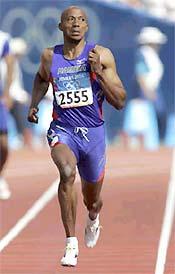Home > Sports > Athens 2004 > Features
Farewell to Fredericks the Great
August 27, 2004
For a man who has given so much to athletics both on an off the track, Frank Fredericks deserved a more fitting farewell.The booing and chanting that delayed the start of the Olympic 200 metres final on Thursday was an unedifying end to the career of an athlete whose very name has become a byword for dignity.
 Fredericks, one of the few not to be booed when his name was announced, pleaded with the crowd to allow the starter to do his job yet every time the athletes went into the blocks the booing and the chanting of "Kenteris" rose up again.
Fredericks, one of the few not to be booed when his name was announced, pleaded with the crowd to allow the starter to do his job yet every time the athletes went into the blocks the booing and the chanting of "Kenteris" rose up again.
The absence of Greek Costas Kenteris, the 2000 Olympic champion who withdrew from the Games after missing a dope test, left a sour taste for the fans who had bought their tickets months ago expecting to see their now fallen hero.
MISPLACED ANGER
If they could have suppressed their misplaced anger they would have realised they were privileged to watch the final performance of a truly great athlete.
Once the starter finally got them under way at the second attempt Fredericks, as always, gave his all.
With 30 metres remaining he was clearly out of the medals as Shawn Crawford led home an American one-two-three. Yet he went all the way to the line, producing an extravagant dip that edged him in front of Francis Obikwelu into fourth place by the width of his skin-tight vest.
His time of 20.14 was his season's best, and though it was shy of his lifetime best of 19.68, it was still pretty impressive for a man five weeks short of his 37th birthday.
Fredericks, ever the gentleman in victory or defeat, waited for Crawford, Bernard Williams and Justin Gatlin to complete their three-way prayer before offering his congratulations.
As the three Americans set off on their lap of honour, Fredericks glanced around at the stadium, took a final look at the giant screen displaying the race result, then turned and walked off the track for the last time.
"I'm just a little bit emotional and a little sad really," he said.
"Obviously I wanted to go out with a medal but I just have to be happy with fourth," said Fredericks, who won silver medals at the 1992 and 1996 Olympics.
Earlier this week, when confirming his plans to retire, he said: "This is it. The end of the 200 is the end of my career.
"I want to go home and spend time with my family."
Home for Fredericks is Windhoek in Namibia, on the west coast of southern Africa, which gained independence from South Africa in 1990.
UNFORTUNATE PRECEDENT
By then Fredericks was already 23 and had been running for 10 years but had been unable to compete because of the sporting boycott of South Africa under apartheid.
Within 12 months he had won a 200 metres silver at the 1991 world championships, setting an unfortunate precedent that was to become the defining feature of his career.
In the 1992 Olympics he took silver in both sprints and repeated the impressive but frustrating feat four years later.
On that occasion it needed world records by Donovan Bailey in the 100 and Michael Johnson in the 200 to deny him.
His one global success came over 200 metres in the 1993 world championships but it was business as usual after that with 200 metres silvers in 1995 and 1997.
Fredericks has 25 sub-20 second 200 metres times to his name and in any other era would have dominated the half-lap sprint.
However, he never bemoaned his bad luck to be around at the same time as Johnson, whose 1996 world record of 19.32 looks set to still be on the books when the next generation of sprinters have retired.
Instead he thanked the God-given talent that enabled him to compete at the highest level and helped to put his young country on the map.
He is a wonderful ambassador for Namibia and has poured a fortune back into disadvantaged areas through his Frank Fredericks Foundation, which helps promising young athletes to complete their studies.
"It's my way of giving back because I have been really fortunate," he says.
The three American medal winners were united in their appreciation of a man they described as a role model for anyone entering the sport.
"It was an honour racing with him, you can do nothing but appreciate him and what he's done," said Gatlin.
"He's a great guy and does a lot for the sport," agreed Crawford. "He carries himself with honour and dignity."
Williams was more straightforward. "I gave Frank Fredericks a hug and thanked him for his contribution to the sport."